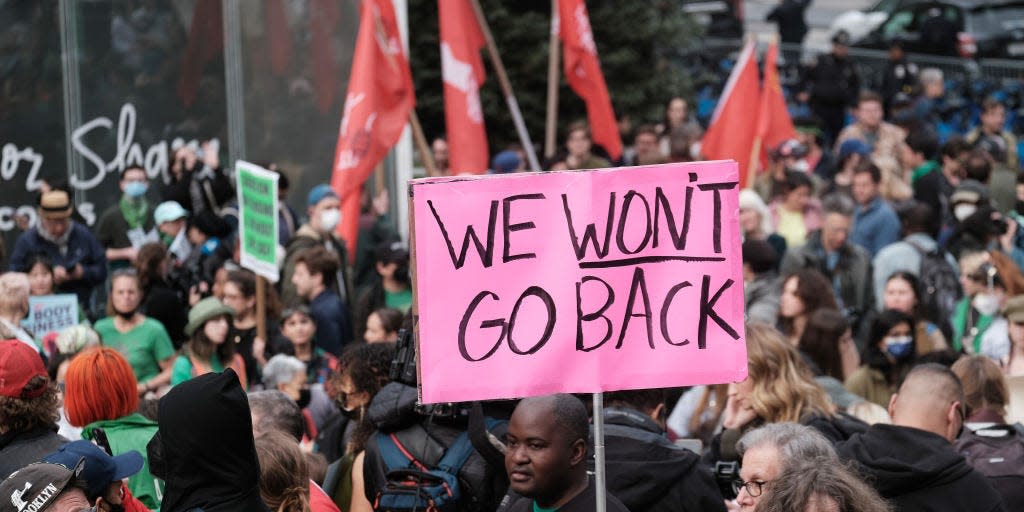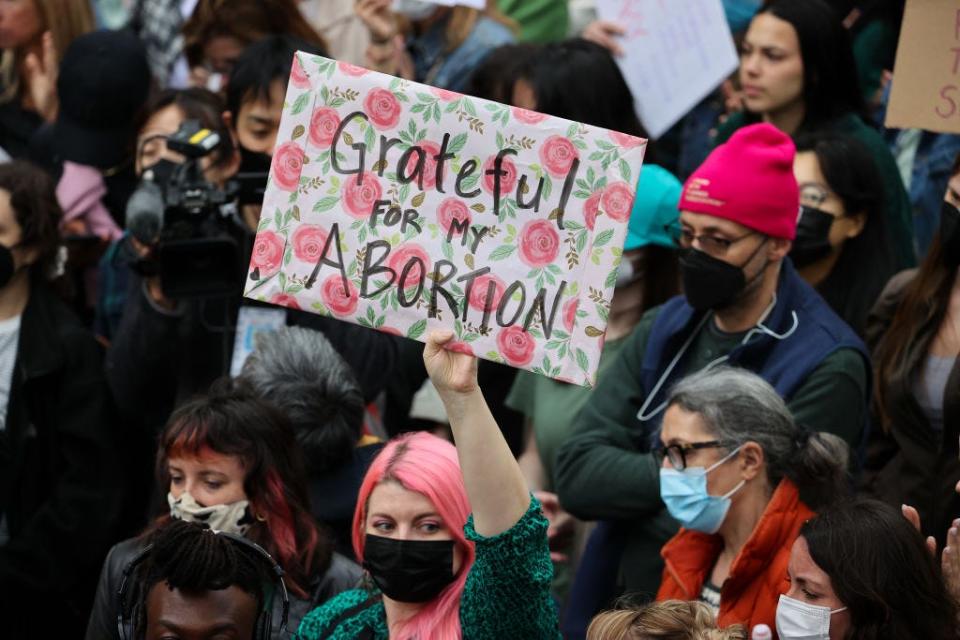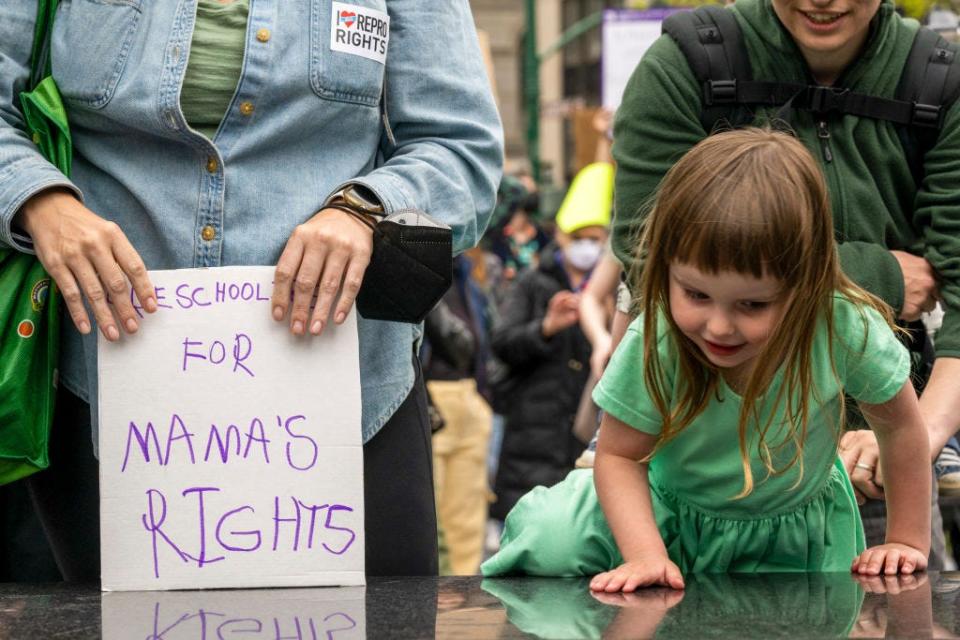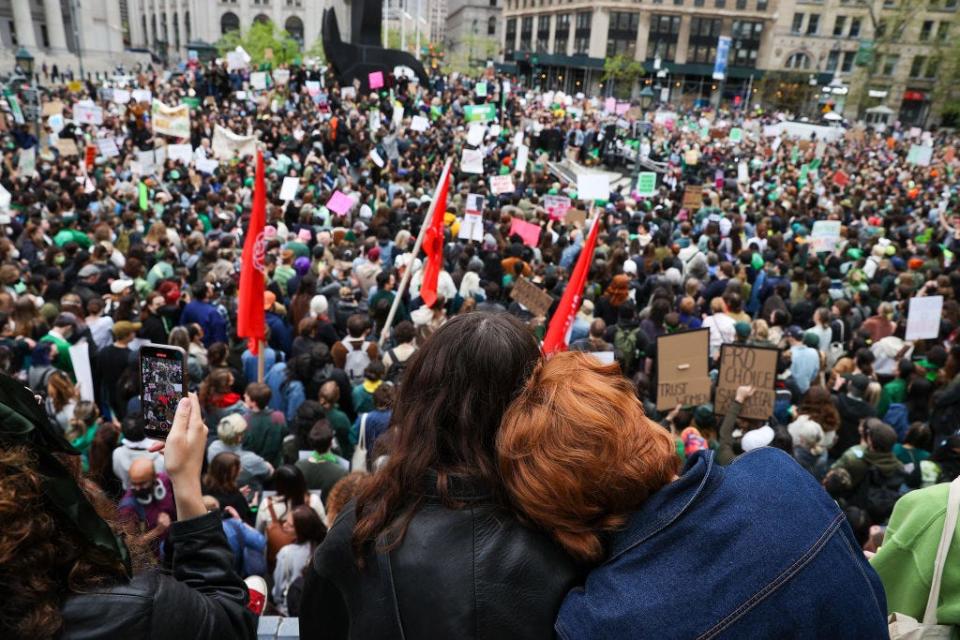What's Next For Roe v. Wade?

Watching the panic unfold with the news that the Supreme Court is likely going to overturn the landmark case Roe v. Wade took me back to the spring of 2019, when a wave of six-week abortion bans was being passed. I watched the panic and threats of a sex strike unfold. But what stood out the most was the rush to talk over reproductive health and justice advocates, abortion fund staff and providers, many of whom were Black and Brown queer folks in the South.
And just like three years ago, we need to remember that at least for now abortion remains legal. Roe hasn’t been overturned yet. The leaked draft opinion, confirmed as authentic by Chief Justice Roberts, did not just pop up out of a vacuum.
Anti-abortion elected officials and legislators have been whittling away at the right to abortion since it was established almost 50 years ago in Roe. Republican-controlled legislators continue pushing the envelope and allegedly are planning for a fight for a six-week abortion ban nationally. Some people may think, Well, that’s unlikely. Nothing can be ruled out or overlooked.
On the 49th anniversary of Roe, Black women-led organizations launched a reproductive justice agenda pushing the nation to think beyond saving abortion access. What did they ask for and what did this mean? The groups called for an increase in funding and support to Black reproductive justice organizations working to ensure equitable access to safe and legal abortion, health care, and other services in Black communities—a key demand because the eradication of abortion care disproportionately affects Black women. They also called for the establishment of a White House Office of Sexual and Reproductive Health and Wellbeing—an important structural shift that could push forward a federal strategy for promoting equitable sexual and reproductive health and well-being. Finally, the groups called for the incorporation of reproductive justice values into foreign policy, which includes ratifying human rights treaties that protect sexual and reproductive health and rights—a key move to undermine the global rise of far-right views on reproductive health and break with the long, painful history of empires using the might of their power to regulate the reproductive freedoms of their subjects. Such an expansive approach to the question of reproductive freedom reminds us that, while necessary, Roe has always been only the floor.

The uproar in 2019 also helped me find my voice and shed the stigma and shame of my abortions. The stigma arose not from my own family or immediate friend circle, but a society that makes us feel wrong or bad for making a necessary decision.
Almost 17 years ago, I had two abortions after giving birth to two amazing children. I remain firm in the belief that it was the best decision for me and my children and my former partner.
Now, as a Black woman living in the South, raising Black reproductive-age people and in community with Black women and birthing people, I am very clear that the answer is not to flee but to fight. As a journalist, I have taken every opportunity to speak with those most directly connected to this fight, learning with each interview the full scope of the work being done around the country.
Last summer on my way back from covering Mississippi’s last remaining abortion clinic, I stopped at the West Alabama Women’s Center in Tuscaloosa, Alabama. I learned that approximately 10 percent of the clients seen at the clinic came from Mississippi. In a recent interview with Jezebel, the clinic’s operations director, Robin Marty, noted that the clinic was absorbing some of the overflow after Planned Parenthood reduced services in the state.
Operated by the Yellowhammer Fund, a reproductive justice organization with an abortion fund, the West Alabama Women’s Center is one of many independent facilities around the country facing a crunch. Directly supporting its work and others, like Preterm in Ohio, can have an immediate and direct impact on people seeking abortion care right now.
Though Roe has been the law of the land for nearly 50 years, for many communities the full promise of abortion access has never been realized. A map from the Center for Reproductive Rights answers the question, “What if Roe fell?” The majority of the country, including states like Wisconsin and Michigan, fall within the not protected or hostile category.
According to the Guttmacher Institute, as of April 14, 536 abortion restrictions have been introduced in 42 states. An estimated 58 percent of women of reproductive age live in states considered hostile to abortion. Many more will reach reproductive age in the coming years.
Peshka Calloway, co-director of West Virginia’s Holler Health Justice, says she does not take the possibility of the end of Roe lightly but feels confident in the network they have built to continue helping people.
“We have an amazing community of volunteers and supporters who have seen us in action, who know how committed we are and will always be, even in the event Roe falls,” Calloway explains. “Folks also may not know that abortion funds in Appalachia have been interconnected since our fund’s founding. We’ve learned from each other, and we rely on each other.”

Debasri Ghosh, managing director of the National Network of Abortion Funds, notes the network’s collective of more than 90 independent abortion funds and clinics. Currently, in the middle of the annual fund-a-thon, people have a real opportunity to organize alongside their friends and communities, and support their local abortion fund.
This also isn’t just about the South and other so-called “red states.” The impact will be felt all over, as those who are able to travel outside of states with outright bans and other prohibitive restrictions do so. The infrastructure to absorb an influx of patients traveling to “safe states” has already been tested by the new clinics and providers in these safe states dealing with the effects of bans in Oklahoma and Texas.
But this is about more than abortion. This is about white supremacist patriarchy bent on denying us full bodily autonomy and self-determination. The right to choose whether to have a family or not should not be left up to the state or the whims of unelected adjudicators operating within a bad-faith legal framework.
If anti-choice officials cared about life as much as they claim, there would be policy proposals improving quality of life, access to employment, childcare, raising the minimum wage, and expanding health care. Many of the states with restrictions also have issues in terms of maternal and reproductive health more generally.

In the many conversations I have had with abortion providers, reproductive justice advocates, and abortion fund staff in the past two years, people are working hard to break through the stigma and provide necessary funds and support for those seeking an abortion. Some of these groups have also led broader mutual aid-related work to make sure mothers, babies, and their families have the basics they need to not only thrive or survive.
Last month for NewsOne, I interviewed Rabia Muqaddam, senior staff attorney at the Center for Reproductive Rights, about Oklahoma’s anti-abortion law.
“Most people seeking abortions are low-income and already struggle to access health care generally,” she explained. “Being denied an abortion imposes substantial medical risk, as carrying a pregnancy to term is far riskier than abortion. People forced to carry their pregnancies to term face life-threatening risks, including preeclampsia.”

This is not the time for smug retorts or political calculus. People’s lives are at stake. Also by dismissing large portions of the country, or saying this is what certain states deserve, people are erasing the work of hundreds of Black and Brown, queer and disabled people who have been doing this work.
Ahead of the 2020 Georgia Senate runoff election, I wrote about Senator Raphael Warnock’s background as a health educator for Harper’s BAZAAR. In years past, a Southern pastor running for a statewide seat may have seen being pro-choice as a liability. But Warnock has leaned into his faith as a reason for supporting people’s right to bodily autonomy. If only some of his colleagues on both sides of the aisle would do the same.
Even as Democrats are rallying at this moment, Speaker of the House Nancy Pelosi doubled down on her support for anti-choice Representative Henry Cuellar. Cuellar claims his personal religious beliefs prevent him from being able to support the rights of others. Cuellar was the only House Democrat to vote against the Women’s Health Protection Act, which would have codified Roe along with other protections.
The right of women and birthing people to make health decisions for themselves should not be preempted by anyone else’s religious beliefs. As much as freedom of religion is about individual practice, it is also about not being made to bear the burden of decisions allegedly made based on the faith of another.
Cuellar has a runoff election later this month against progressive challenger Jessica Cisneros. Cisneros has capitalized on this opportunity, highlighting her own support for this vital issue. Given the stakes in Texas, having a fighter for reproductive rights and justice in the House could mean a lot to some voters right now.
Cisneros is one of several progressive women running for office who know the stakes with reproductive health firsthand. Other House candidates like state Representatives Summer Lee and Attica Scott, and South Carolina gubernatorial candidate state Senator Mia McLeod, have been a part of the legislative vanguard fighting for abortion rights, but also the resources and policies needed to improve people’s quality of life.
You Might Also Like

